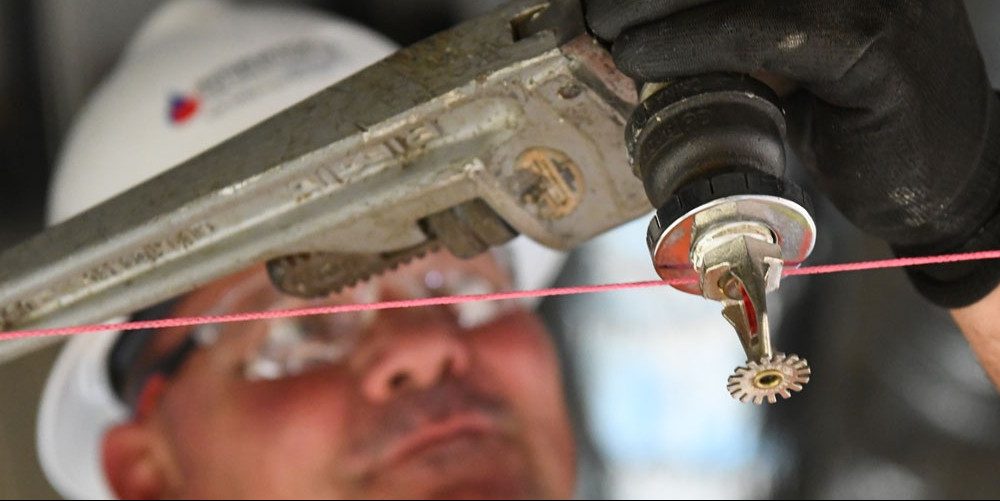
Fire sprinkler systems need to be regularly inspected to ensure they will function properly in the event of a fire. In the event of an emergency, the effective functioning of fire sprinklers, suppression, alarm and detection, and monitoring systems depends on their proper installation, ongoing maintenance, and inspection.
The frequency with which inspections are required according to NFPA 25 will depend on various factors, including the type of sprinklers you have, building occupancy, insurance requirements, and local code. Keeping up to date on these inspections will ensure you are maximizing your fire sprinkler system’s life expectancy.
NFPA 25 Fire Sprinkler Inspections
Fire sprinkler inspections detect potential issues early. This allows you to plan for timely repairs or replacements to prevent system failure during emergencies. When you’re choosing a fire protection company, prioritize those that stay up to date on regulations and emerging technologies. Make sure they offer regularly scheduled inspections that meet your unique needs, and that they will provide detailed reports and transparent repair quotes. Be sure to look for 24/7 availability for emergency repairs and certified inspectors who have a reputation for adhering to industry standards. A reliable company should prioritize your system’s functionality and compliance over everything else.
Monthly Inspection
A visual inspection should be done monthly on the gauges of your sprinkler system to ensure the pressure is within a normal range. This can be done by a building manager and doesn’t necessarily require professional assistance.
Quarterly Inspection
Each quarter, a visual inspection of all fire protection equipment should be performed to determine there isn’t any physical damage. This includes your pipes, alarm devices, fire department connections, control valves, etc.
Annual Inspection
An annual inspection involves a hands-on inspection of every piece of equipment in every room. The inspector will look for rust, corrosion, defective sprinkler heads, and other impairments. Control valves should be put through their entire range of motion and fire pumps/dry systems should be flow tested.
5 Year Inspection
Every five years, all internal pipework, sprinkler gauges, and sprinkler heads should be inspected and evaluated to check for blockages. This is an important step to maintain well-working parts throughout the fire sprinkler system life expectancy.
Fire Sprinkler System Replacement
NFPA 25 governs the replacement of fire sprinkler heads in commercial systems. The process involves assessing the situation, acquiring the necessary parts, replacing the heads, and bringing the system back online. Non-working sprinklers may constitute system impairments, requiring administrative measures and possibly a fire watch.
NFPA outlines three levels of concern for system problems: non-critical deficiencies, critical deficiencies, and impairments. To address an impairment, protective measures are necessary until the system is fixed. After replacement, the system must be recharged, and a professional test may be required, depending on the extent of the issue.
What is Your Fire Sprinkler System Life Expectancy?
While dry systems prevent freezing issues, wet systems generally boast a longer lifespan, lasting 15 to 25 years compared to dry systems’ 8 to 12 years. This discrepancy arises from the presence of oxygen in pressurized air, accelerating metal corrosion in dry systems. To prolong system life, investing in high-quality equipment and scheduling regular professional inspections every five years is crucial.
Replacing Your Fire Sprinkler System After An Event
After a fire, conduct thorough fire sprinkler inspections and replace any damaged parts promptly to restore full functionality. For example, following a dry chemical system discharge, rebuilding, or replacing valves may be necessary to address leaks. Clean agent systems typically only require refilling. Always follow the manufacturer’s instructions for refilling or recharging.
Fire Sprinkler Service
By having regular maintenance and inspection done to keep corrosion at bay, and replacing affected parts, you can prolong your fire sprinkler system life expectancy. International Fire Protection offers premium service and inspection for all fire protection systems. Our technicians have the experience and expertise to inspect, maintain, and service your fire sprinkler systems so that your residential, commercial, or industrial building remains safe and meets the requirements of NFPA 25. We are ready to serve you from our office locations across the Southeast United States! Call the office nearest you to schedule an inspection, repair, or service call!
